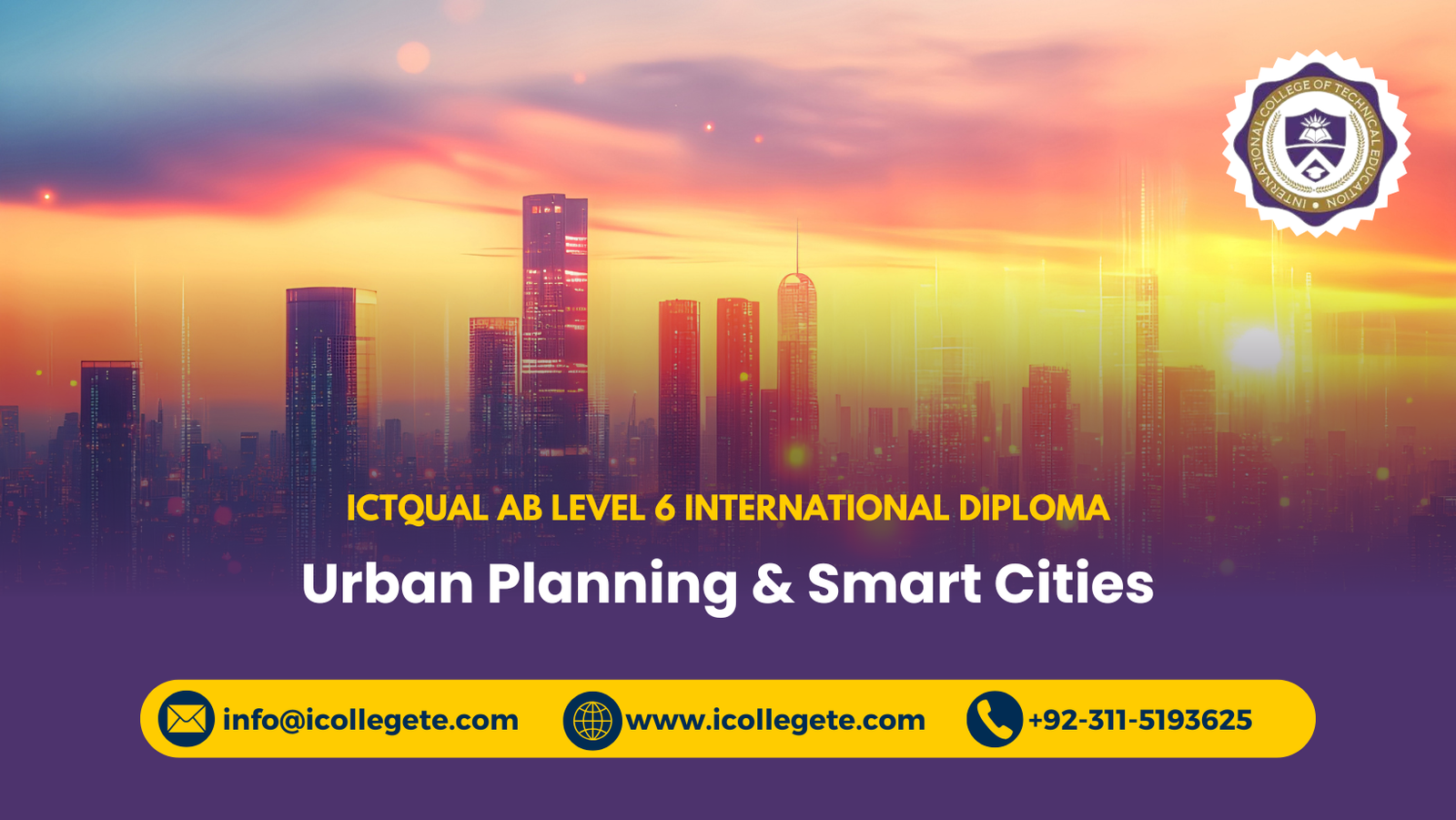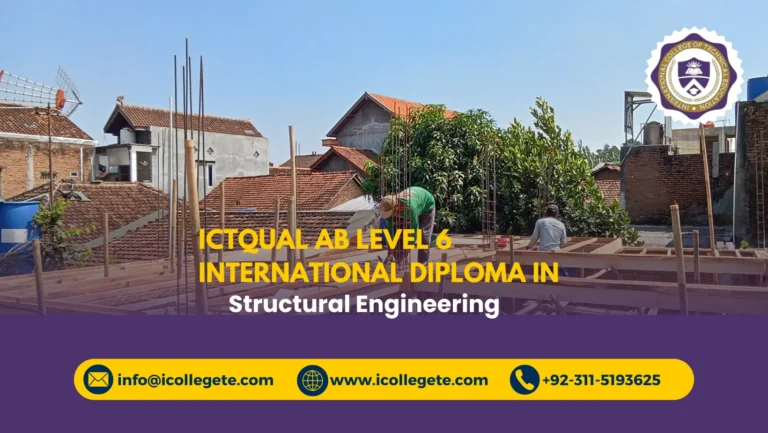The ICTQual AB Level 6 International Diploma in Urban Planning & Smart Cities is a globally recognized three‑year, 360‑credit qualification designed to prepare learners for leadership roles in modern urban development and smart city innovation. This advanced program equips professionals with the knowledge and skills to design sustainable cities, manage infrastructure, and integrate digital technologies into urban planning.
Learners gain expertise in urban policy, transportation systems, smart infrastructure, and sustainable housing. The curriculum blends theoretical learning with practical applications, ensuring graduates are prepared to meet the challenges of rapid urbanization and global sustainability goals.
This diploma is ideal for fresh graduates entering the urban planning and smart city field, as well as experienced professionals seeking to advance their careers in city management, infrastructure development, and sustainable innovation. By combining academic rigor with applied skills, the ICTQual AB Level 6 Diploma empowers learners to become leaders in shaping the cities of the future.
Year 1 – Foundation in Urban Planning & Smart Cities
- Principles of Urban Planning and Smart Cities
- Introduction to Urban Development Projects
- Construction Materials and Methods in Urban Infrastructure
- Spatial Planning and Design Principles
- Project Planning and Scheduling in Urban Projects
- Health, Safety, and Environmental Awareness
- Communication and Stakeholder Management in Urban Planning
- Digital Tools and Construction Technology Fundamentals
- Financial Management in Urban Projects
- Quality Assurance and Control in Urban Development
- Legal and Regulatory Frameworks in Urban Planning
- Professional Ethics and Conduct in Planning
Year 2 – Intermediate Urban Planning & Smart Cities Practices
- Advanced Urban Design and Planning Techniques
- Resource Management and Allocation in Projects
- Project Cost Estimation and Budgeting in Urban Development
- Construction Contract Administration
- Procurement and Supply Chain Management in Urban Projects
- Project Risk Analysis and Mitigation
- Leadership and Team Management in Urban Planning
- Site and Infrastructure Management
- Sustainable Development and Environmental Management
- Project Monitoring and Reporting
- Problem-Solving and Decision-Making in Urban Projects
- Communication and Negotiation Skills in Planning
Year 3 – Advanced Urban Planning & Strategic Leadership
- Strategic Urban Planning and Smart City Management
- Advanced Infrastructure and Project Planning
- Urban Transport and Mobility Systems Management
- Innovation and Emerging Technologies in Smart Cities
- Advanced Risk and Crisis Management in Urban Projects
- Contract Management and Legal Compliance
- Leadership in Urban Planning Projects
- Advanced Project Control and Performance Measurement
- Project Governance and Compliance in Smart City Projects
- Research Methods and Project Analysis in Urban Planning
- Capstone Project in Urban Planning & Smart Cities
- Professional Development and Career Planning
Year 1 – Foundation in Urban Planning & Smart Cities
Principles of Urban Planning and Smart Cities
- Understand fundamental concepts of urban planning, smart cities, and sustainable development.
- Analyse urban growth patterns, city structures, and planning strategies.
- Explore the integration of technology in modern city planning.
- Apply basic planning principles to conceptual urban projects.
Introduction to Urban Development Projects
- Identify types of urban development projects and their objectives.
- Understand the roles and responsibilities of urban planners and project managers.
- Analyse project feasibility and stakeholder requirements.
- Develop basic project proposals for urban initiatives.
Construction Materials and Methods in Urban Infrastructure
- Describe common construction materials and methods used in Urban Planning & Smart Cities projects.
- Evaluate material selection for durability, sustainability, and cost.
- Apply knowledge of construction techniques to project planning.
- Understand the impact of material choices on project timelines and budgets.
Spatial Planning and Design Principles
- Apply design principles to urban layouts and spatial arrangements.
- Integrate functionality, aesthetics, and accessibility in planning.
- Develop conceptual site and urban designs.
- Assess spatial plans for efficiency and compliance with standards.
Project Planning and Scheduling in Urban Projects
- Develop basic urban project plans with timelines and milestones.
- Use scheduling tools to sequence project activities effectively.
- Identify dependencies and critical paths in urban initiatives.
- Adjust schedules to accommodate changes or resource constraints.
Health, Safety, and Environmental Awareness
- Demonstrate knowledge of HSE regulations in urban projects.
- Apply safe working practices in site inspections and planning activities.
- Conduct preliminary environmental impact assessments.
- Promote sustainable and safe urban design solutions.
Communication and Stakeholder Management in Urban Planning
- Identify key stakeholders and their expectations.
- Communicate urban planning proposals effectively using visual and written methods.
- Manage stakeholder feedback and requirements.
- Resolve minor conflicts to maintain positive project engagement.
Digital Tools and Construction Technology Fundamentals
- Understand technological applications in urban planning and smart cities.
- Evaluate digital tools such as GIS, CAD, and modelling software.
- Apply technology to improve planning efficiency and accuracy.
- Explore emerging software solutions for urban design and management.
Financial Management in Urban Projects
- Interpret project budgets, financial statements, and cost reports.
- Apply cost estimation and control principles in urban development projects.
- Monitor expenditures and identify variances.
- Support financial decision-making for resource allocation.
Quality Assurance and Control in Urban Development
- Understand quality management principles in urban planning.
- Implement quality control processes to meet project standards.
- Monitor adherence to design and regulatory specifications.
- Recommend improvements to enhance project quality.
Legal and Regulatory Frameworks in Urban Planning
- Understand statutory, regulatory, and contractual requirements in urban projects.
- Apply compliance measures to planning and design activities.
- Identify potential legal risks and mitigation strategies.
- Evaluate the impact of regulations on project outcomes.
Professional Ethics and Conduct in Planning
- Recognise professional ethical standards in urban planning.
- Apply ethical decision-making in project scenarios.
- Promote transparency, accountability, and integrity in planning processes.
- Understand responsibilities to communities, clients, and colleagues.
Year 2 – Intermediate Urban Planning & Smart Cities Practices
Advanced Urban Design and Planning Techniques
- Develop complex urban designs using advanced planning methods.
- Apply GIS, 3D modelling, and digital tools in project design.
- Integrate multidisciplinary considerations into urban projects.
- Optimise designs for functionality, sustainability, and community impact.
Resource Management and Allocation in Projects
- Manage human, material, and financial resources efficiently.
- Analyse and allocate resources for urban development projects.
- Monitor utilisation and productivity across project teams.
- Adjust resource plans to meet project objectives and timelines.
Project Cost Estimation and Budgeting in Urban Development
- Prepare detailed cost estimates for urban planning projects.
- Monitor and control project budgets and expenditures.
- Conduct cost-benefit analysis for decision-making.
- Identify financial risks and implement mitigation strategies.
Construction Contract Administration
- Understand various types of construction and service contracts.
- Administer contracts in line with regulatory and project requirements.
- Monitor contractor performance and deliverables.
- Resolve disputes and enforce compliance professionally.
Procurement and Supply Chain Management in Urban Projects
- Plan procurement processes and select suppliers effectively.
- Manage contracts and optimise supply chains for urban projects.
- Monitor supplier performance and ensure timely delivery.
- Align procurement with project budgets and schedules.
Project Risk Analysis and Mitigation
- Conduct comprehensive risk assessments for urban projects.
- Develop and implement mitigation strategies and contingency plans.
- Monitor risk factors and evaluate effectiveness of strategies.
- Adjust plans to reduce risk impacts on urban development.
Leadership and Team Management in Urban Planning
- Demonstrate leadership skills in multidisciplinary project teams.
- Manage team dynamics and resolve conflicts effectively.
- Motivate and guide team members to achieve objectives.
- Foster collaboration, accountability, and high-quality outputs.
Site and Infrastructure Management
- Plan and supervise site operations and infrastructure projects.
- Ensure safety, efficiency, and regulatory compliance on site.
- Coordinate workforce, materials, and equipment effectively.
- Monitor daily operations and report progress to stakeholders.
Sustainable Development and Environmental Management
- Apply sustainable planning principles in urban development projects.
- Evaluate environmental impacts and implement management strategies.
- Integrate eco-friendly solutions into design and planning.
- Promote energy efficiency, resilience, and sustainability in cities.
Project Monitoring and Reporting
- Track project progress against established objectives and timelines.
- Prepare professional reports for stakeholders.
- Analyse performance data to identify delays or issues.
- Recommend corrective actions to maintain project alignment.
Problem-Solving and Decision-Making in Urban Projects
- Apply analytical techniques to address urban planning challenges.
- Make informed decisions using data, modelling, and simulations.
- Evaluate alternative solutions for feasibility and impact.
- Document decisions and outcomes for accountability and learning.
Communication and Negotiation Skills in Planning
- Demonstrate effective written, verbal, and visual communication.
- Apply negotiation strategies to achieve project objectives.
- Engage stakeholders in collaborative decision-making.
- Resolve conflicts and secure consensus on planning decisions.
Year 3 – Advanced Urban Planning & Strategic Leadership
Strategic Urban Planning and Smart City Management
- Develop strategic plans for large-scale urban and smart city projects.
- Align planning objectives with governmental, community, and organisational goals.
- Analyse socio-economic, environmental, and technical factors impacting cities.
- Apply strategic frameworks to optimise urban project workflows.
Advanced Infrastructure and Project Planning
- Lead infrastructure project planning integrating multiple disciplines.
- Incorporate technical, financial, and regulatory considerations.
- Coordinate teams across design, engineering, and municipal functions.
- Optimise planning efficiency through digital tools and simulation models.
Urban Transport and Mobility Systems Management
- Design and manage urban transport systems and mobility solutions.
- Analyse traffic flows, public transport networks, and logistics.
- Integrate smart mobility technologies into urban planning.
- Monitor and improve efficiency, safety, and sustainability of transport systems.
Innovation and Emerging Technologies in Smart Cities
- Identify opportunities for technological innovation in urban planning.
- Apply digital solutions, IoT, and data analytics for city management.
- Promote creativity and continuous improvement in project teams.
- Evaluate new technologies for practical and sustainable urban implementation.
Advanced Risk and Crisis Management in Urban Projects
- Conduct high-level risk assessments for urban projects.
- Develop contingency and mitigation plans for crises and emergencies.
- Manage unexpected events to maintain continuity and compliance.
- Evaluate risk management strategies for improvement.
Contract Management and Legal Compliance
- Understand complex construction and service contracts in urban projects.
- Ensure compliance with statutory, regulatory, and contractual requirements.
- Negotiate and resolve disputes professionally.
- Apply legal knowledge to minimise project liabilities.
Leadership in Urban Planning Projects
- Lead multidisciplinary teams in complex urban initiatives.
- Mentor, motivate, and develop team members effectively.
- Implement strategies for collaboration, accountability, and high performance.
- Promote ethical conduct and professional standards in project leadership.
Advanced Project Control and Performance Measurement
- Monitor and control urban project progress using advanced tools.
- Measure performance using KPIs, benchmarks, and analytical dashboards.
- Identify deviations and implement corrective actions.
- Produce professional reports for decision-makers and stakeholders.
Project Governance and Compliance in Smart City Projects
- Apply governance frameworks to ensure accountability and transparency.
- Ensure compliance with industry standards, regulations, and client requirements.
- Establish monitoring and reporting mechanisms.
- Review and improve governance practices for continuous enhancement.
Research Methods and Project Analysis in Urban Planning
- Conduct research to support evidence-based urban planning decisions.
- Analyse project data to improve design, implementation, and management.
- Apply statistical and analytical methods to interpret findings.
- Present research outcomes in professional reports or presentations.
Capstone Project in Urban Planning & Smart Cities
- Integrate knowledge and skills from all units into a practical project.
- Demonstrate competence in planning, design, project management, and innovation.
- Apply leadership and problem-solving skills in real-world scenarios.
- Produce a professional portfolio, report, and presentation of project outcomes.
- 1. Comprehensive Understanding of Smart City Development
- Gain in-depth knowledge of urban planning principles integrated with modern smart city technologies.
- Learn how to design cities that are sustainable, efficient, and technology-driven.
- Understand how IoT, AI, and digital infrastructure enhance city management and livability.
- Develop the ability to plan and implement smart urban projects with global standards.
- Build analytical and strategic thinking skills for solving modern urban challenges.
- 2. Global Recognition and Career Mobility
- The qualification is recognized internationally, opening doors to career opportunities worldwide.
- Enhances credibility for roles in global urban planning and infrastructure organizations.
- Provides pathways to work with multinational companies and government agencies.
- Facilitates progression to higher academic qualifications in urban planning and sustainability.
- 3. Practical and Industry-Relevant Skills
- Learn how to apply real-world data and digital tools to improve urban efficiency.
- Acquire project management, GIS, and environmental impact assessment skills.
- Develop competence in smart infrastructure planning and policy implementation.
- Understand economic, social, and technological factors shaping modern cities.
- 4. Career Advancement Opportunities
- Prepare for senior roles such as Urban Planner, Smart City Manager, or Infrastructure Consultant.
- Strengthen leadership and management capabilities for large-scale urban projects.
- Boost professional growth in public and private sector planning departments.
- Equip yourself to participate in global sustainability and smart development initiatives.
- 5. Contribution to Sustainable Urban Growth
- Learn to promote eco-friendly, energy-efficient, and people-centered urban designs.
- Gain expertise in reducing urban carbon footprints through innovative planning.
- Understand global environmental policies related to sustainable urbanization.
- Empower yourself to create livable, resilient, and future-ready cities.
- 6. Enhanced Professional Competence
- Build confidence in making strategic decisions in urban development.
- Master tools and frameworks used by leading urban planning professionals.
- Learn multidisciplinary approaches involving engineering, architecture, and policy.
- Develop communication and presentation skills for professional urban planning proposals.
- 7. Networking and Global Exposure
- Connect with professionals, experts, and organizations involved in smart city projects.
- Gain exposure to global case studies and best practices in sustainable development.
- Participate in industry events, workshops, and seminars for professional growth.
- Strengthen your international professional profile in urban planning and innovation.
The ICTQual AB Level 6 International Diploma in Urban Planning & Smart Cities is designed for learners and professionals aiming to build or advance careers in modern city development and smart infrastructure. Enrollment is suitable for:
- Fresh graduates: Individuals with backgrounds in urban studies, civil engineering, architecture, or environmental science who want to enter the urban planning and smart city sector.
- Urban planning professionals: City planners, architects, engineers, and policy makers seeking advanced knowledge in sustainable development and smart city innovation.
- Career changers: Professionals from related industries such as construction, transportation, or IT who wish to transition into urban planning and smart city management.
- International learners: With British Council verification and MOFA & Embassy attestation, the diploma is ideal for those pursuing global career opportunities in city development.
- Middle East job seekers: The qualification is highly valued for Iqama approval and career advancement in the Middle East’s rapidly growing smart city projects.











